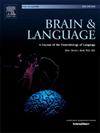Neural evidence for perceiving a vowel merger after a social interaction within a native language
IF 2.3
2区 心理学
Q1 AUDIOLOGY & SPEECH-LANGUAGE PATHOLOGY
引用次数: 0
Abstract
Although previous research has shown that speakers adapt on the words they use, it remains unclear whether speakers adapt their phonological representations, leading them to perceive new phonemic contrasts following a social interaction. This event-related potential (ERP) study investigates whether the neuronal responses to the perception of the /e/-/ε/ vowel merger in Northern French speakers show evidence for discriminating /e/ and /ε/ phonemes after interacting with a speaker who produced this contrast. Northern French participants engaged in an interactive map task and we measured their ERP responses elicited after the presentation of a last syllable which was either phonemically identical to or different from preceding syllables. There was no evidence for discrimination between /e/ and /ε/ phonemes before the social interaction, while mismatch negativity (MMN) and late responses revealed /e/-/ε/ discrimination after the social interaction. The findings suggest rapid neuronal adaptations of phonemic representations thanks to the social interaction.
在母语社会互动后感知元音合并的神经证据。
尽管先前的研究表明,说话者会对他们使用的单词进行调整,但目前尚不清楚说话者是否会调整他们的语音表征,从而导致他们在社交互动后感知到新的音位对比。事件相关电位(event- correlation potential, ERP)研究了北部法语使用者对/e/-/ε/元音合并感知的神经元反应是否在与产生这种对比的说话者互动后显示出区分/e/和/ε/音素的证据。法国北部的参与者参与了一项互动地图任务,我们测量了他们在呈现与前一个音节相同或不同的最后一个音节后所引起的ERP反应。在社会互动前,/e/和/ε/音素之间不存在歧视,而在社会互动后,错配负性(MMN)和后期反应则存在/e/-/ε/歧视。研究结果表明,由于社会互动,神经元对音位表征的快速适应。
本文章由计算机程序翻译,如有差异,请以英文原文为准。
求助全文
约1分钟内获得全文
求助全文
来源期刊

Brain and Language
医学-神经科学
CiteScore
4.50
自引率
8.00%
发文量
82
审稿时长
20.5 weeks
期刊介绍:
An interdisciplinary journal, Brain and Language publishes articles that elucidate the complex relationships among language, brain, and behavior. The journal covers the large variety of modern techniques in cognitive neuroscience, including functional and structural brain imaging, electrophysiology, cellular and molecular neurobiology, genetics, lesion-based approaches, and computational modeling. All articles must relate to human language and be relevant to the understanding of its neurobiological and neurocognitive bases. Published articles in the journal are expected to have significant theoretical novelty and/or practical implications, and use perspectives and methods from psychology, linguistics, and neuroscience along with brain data and brain measures.
 求助内容:
求助内容: 应助结果提醒方式:
应助结果提醒方式:


